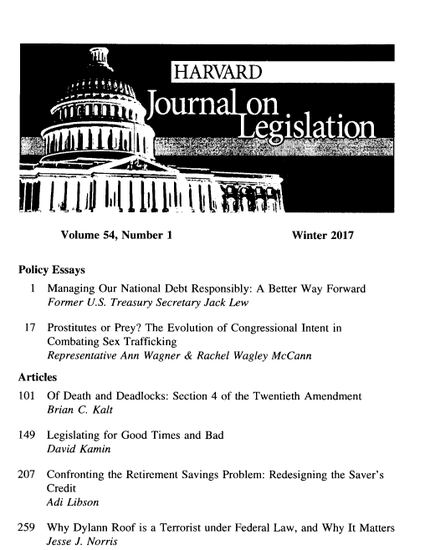
Article
Federal Preemption of Local Right-to-Work Ordinances
Harvard Journal on Legislation
(2017)
Abstract
Conservative organizations such as the Heritage Foundation and the American Legislative Exchange Council (ALEC) are promoting a national campaign encouraging municipal entities, such as counties and cities, to pass right-to-work ordinances. The litigation concerning these ordinances is being followed closely across the nation because some view these ordinances as a necessary economic development tool, while others view them as an attempt to create havoc in labor-relations and undermine union power. But are these local ordinances preempted by a federal statute, the National Labor Relations Act (NLRA)? That is the legal issue currently pending in the federal courts. This article answers the question with a resounding “yes.” The article contributes two distinct benefits to the negligible and outdated academic discussion of this important topic. First, the article is an in-depth exploration of NLRA preemption, without consideration of state law, which permits the issue to be treated more completely than ever before. Second, it provides a modern view of an issue that has been largely ignored for twenty-five years. The article first explains the various forms of union security that employers and unions have historically bargained for, emphasizing that under current federal law no employee is required to join a union. Each employee may instead pay a fee in an amount that simply covers the cost to represent that employee. The article then explains the broad preemptive effect of the NLRA which insures uniformity in labor relations. The article discusses how two preemption doctrines require an expert board to determine labor relations issues and foster predictability in bargaining and industrial peace. The article next introduces a narrow exception to the comprehensive federal preemption of states’ ability to regulate in the area of labor relations – the ability of states to pass right-to-work laws. The necessary background having been covered, the article then turns to the issue of local-right-to-work ordinances. To support the conclusion that these local-right-to-work ordinances are preempted by the NLRA, the article first applies the two preemption doctrines to the enactment of these ordinances. The article then explains how every court to address the issue has found the ordinances preempted and how labor law experts, including the vice president of the National Right to Work Committee, agree the ordinances are preempted. Next, the article examines the language of the NLRA and the legislative history behind the passage of the section of the NLRA permitting states to pass right-to-work laws. Both the language and the legislative history support the conclusion that the local right-to-work ordinances are preempted. Finally, the article compares and contrasts the NLRA’s broad preemption of local right-to-work ordinances to schemes of preemption under other federal statutes. The article concludes by explaining that, given the federal preemption of local right-to-work ordinances, expending municipal funds to enact such ordinances is a poor use of taxpayer funds and suggesting areas for further research.
Keywords
- labor law,
- preemption,
- right-to-work,
- NLRA,
- National Labor Relations Act
Disciplines
Publication Date
2017
Citation Information
Ari R Levinson, Alyssa Hare and Travis Fiechter. "Federal Preemption of Local Right-to-Work Ordinances" Harvard Journal on Legislation Vol. 54 Iss. 2 (2017) p. 401 - 446 Available at: http://works.bepress.com/ari-levinson/1/
